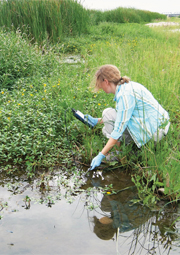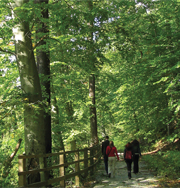Q&A with Christopher Boone
Dr. Boone is associate professor in the School of Human Evolution and Social Change and in the School of Sustainability, where he is also graduate chair. His extensive work in urban sustainability explores the relationships between cities and the natural environment to find ways that urban ecosystems can be strategically focused to reduce the negative effects of world poverty.
What triggered your focus on sustainability?
As a new graduate student in 1987, I read the United Nations report Our Common Future and recognized its ideas as a radical departure from the usual compromises between human development and the environment. Then, in the late 1990s, I had the opportunity to join the Baltimore Ecosystem Study, a large integrated project with a team of 50 scientists working to understand how a metropolitan area functions as an ecosystem. Through this work, we began to find ways to translate our science into actions that would ensure a prosperous, healthy, and meaningful future for all residents of the Chesapeake. My participation in the Central Arizona—Phoenix Long-Term Ecological Research project continues that work.
What are your most important sustainability-related research projects?
I am working on two related projects that examine how ecosystem services (the benefits of our natural environment such as clean water and air) are distributed in metropolitan areas. The first project looks at the environmental benefits and costs of planting and maintaining tree canopies in five U.S. cities: Phoenix, Los Angeles, Sacramento, Baltimore, and Miami. The second, a book project, surveys the uneven consequences of global environmental change on urban residents around the world. For both projects, the primary concern is assessing the environmental justice of ecosystem services — who gains most from the ecosystem services we develop and nurture in metropolitan areas and how these services could be more equitably distributed.
How will your sustainability-related research affect policy decisions in the “real world”?
Strategically provided ecosystem services can improve health and quality of life, make cities more livable, attract investment, and reduce operating costs to individuals and municipalities. Our research on urban tree canopies will provide decision-makers with information on best practices for managing ecosystem services, including benefit and cost trade-offs and how to reach the most vulnerable populations.
What is the world sustainability challenge that concerns you the most?
Grinding poverty undermines long-term environmental stewardship and the basic principles of justice that are fundamental to sustainability. We cannot achieve global sustainability while substantial numbers of people around the world try to subsist on less than a dollar a day.
April 30, 2010


